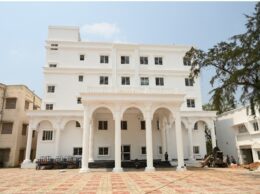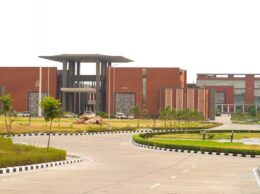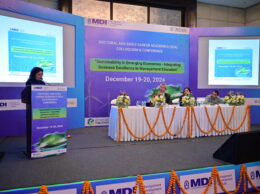CHENNAI: Indian Institute of Information Technology, Design and Manufacturing – Kancheepuram hosted the 4th edition of the Conference on Information and Communication Technology (CICT) virtually from 3rd to 5th December 2020. Key advances in 5G Technology in India and abroad and their practical applications were deliberated during this conference.
CICT provided a forum to present and exchange ideas in the latest technological advancements and innovations in the field of Information and Communication Technology. CICT 2020 was virtually hosted by IIITDM Kancheepuram, an ‘Institute of National Importance’ coming under Ministry of Education, Govt. of India, and located near Chennai. The conference was technically co-sponsored by IEEE Madras section.
IIITDM Kancheepuram is a ‘Center of Excellence’ in design and manufacturing of IT and IT-enabled products. Its Faculty members have contributed significantly to ‘Cooperative Communication’, ‘Internet of Things’, ‘Artificial Intelligence’ and ‘Non-Orthogonal Multiple Access,’ which are technologies of 5G Cellular Networks.
Delivering the Inaugural keynote address on ‘5G and the Internet of Skills,’ Prof. Mischa Dohler, Chair Professor of Wireless Communications, King’s College, London, said, “The Internet after we are done with fixed Mobile Internet and Internet of Things will be the Skills Internet where we would be able to transmit skills through the Internet. How would this be possible? 20-30 years ago, if someone had said that you would be able to listen to music and watch movies on your mobile phone streaming them, they would have said ‘you are crazy.’ Therefore, it is not unthinkable that in a few years’ time, we will have ‘Internet of Skills’ up and running.”
Prof. Mischa Dohler, a Fellow of the Royal Academy of Engineering, stated that they started to build this next-generation Internet in 2014. The ‘Internet of Skills’ would be an enabler for remote skillset delivery and thereby democratize labour globally the same way as the Internet had democratised knowledge.
Giving a practical application of ‘Internet of Skills’ through 5G technology, Prof. Mischa Dohler said, “Kerala in India witnesses a lot of rainfalls, landslides and it is remote and difficult to access. You could have the whole planet help by flying in industrial drones from anywhere in the world and bring medicine, food, and water into the crisis area. The applications are endless and it is possible because of the Internet of Skills and 5G.”
The Department of Science and Technology, Government of India, sanctioned Rs. 32.51 lakh for a sponsored project on ‘Investigations on the Cell Phone Tower Radiation and Mitigation Techniques’ headed by Dr. M.D. Selvaraj, Associate Professor, Department of Electronics and Communication Engineering, IIITDM Kancheepuram, in which suggestions would be given to mitigate the adverse effects of cellular radiations.
Speaking on ‘India’s Ascent up the 5G Ladder,’ Prof. Kiran Kumar Kuchi, Department of Electrical Engineering, IIT Hyderabad, said, “5G and IoT Technology ownership and control is critical to National Interest. 5G is going to be part and parcel of national critical infrastructure. Therefore, there is a lot more attention given to 5G as opposed to the previous technologies. It can enhance current R&D capabilities and it is also important that India develops its own domestic manufacturing capabilities as well as ownership of the Intellectual Property that gets into these systems in terms of IP, software, and patents, among others.”
Giving some TRAI statistics on India’s Mobile Telephony, Prof. Kiran Kuchi said, “Mobile Broadband was the prime source of Internet access in India with 80 per cent of the Internet traffic generated by mobile phones. India is one of the few countries that has among the lowest data charges with the average data consumption per smart phone being 11 GB – the highest in the world.”
Spectrum is a key resource to offer reliable wireless Internet services. Indigenous 5G development likely to speed up in the near term. Ministry of Electronics and Information Technology (MeitY) and Department of Telecommunication (DoT) have been funding research for several years, added Prof. Kiran Kuchi.
Delivering a keynote address ‘On the Process of Making Breakthroughs in Engineering,’ Prof. Thomas Kailath, Hitachi America Professor Emeritus of Engineering, Department of Electrical Engineering, Stanford University, U.S., “You have to find the right problem… This takes experience, intuition and luck. But luck does not just happen. If you are alert to all the opportunities, the luck will be that you will recognize that something you knew in a different field could solve this problem. It is also important to have broad interests to be able to cross-apply tools/perspectives/ideas from other fields.”
Prof. Thomas Kailath added, “There were two types of breakthroughs – Geniuses and Revolutionary ones and Ordinary breakthroughs. One does not really start by seeking breakthroughs. They just happen in the course of trying to solve a problem.”
In addition, the conference also hosted an Industry Forum which included a plenary talk by Mr. Narendra Ghate, Chief Designer, Tata Elxsi and a panel discussion on ‘Impact of 5G on IoT and Digital transformation in Indian Manufacturing.’
The conference featured presentations on contributed papers from India and abroad in 12 different tracks including AI and ML, Big Data Analytics and Cloud computing, CoVID-19 Technologies and Data Analysis, among others. CICT 2020 received a total of 154 submissions in regular tracks, 12 in PhD Track and 14 in Best PhD thesis submissions from multiple countries including the U.S.
Other eminent academics who participated in the conference include Prof. P. Nagabhushan, Director, IIIT Allahabad, Prof. Rajendra Sahu, Director, ABV-IIITM Gwalior, Prof. Sanjeev Jain, Director, PDPM-IIITDM Jabalpur, Prof. DVLN Somayajulu, Director, IIITDM Kurnool, Prof. S Sadagopan Chairman, Board of Governors, IIITDM Kancheepuram, Prof. Banshidhar Majhi, Director, IIITDM Kancheepuram and Dr. Sathish Singh, IIIT Allahabad and General Chair, CICT 2020, among others.









